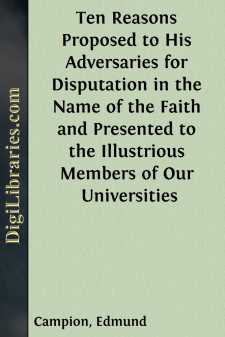Categories
- Antiques & Collectibles 13
- Architecture 36
- Art 48
- Bibles 22
- Biography & Autobiography 813
- Body, Mind & Spirit 142
- Business & Economics 28
- Children's Books 17
- Children's Fiction 14
- Computers 4
- Cooking 94
- Crafts & Hobbies 4
- Drama 346
- Education 46
- Family & Relationships 57
- Fiction 11829
- Games 19
- Gardening 17
- Health & Fitness 34
- History 1377
- House & Home 1
- Humor 147
- Juvenile Fiction 1873
- Juvenile Nonfiction 202
- Language Arts & Disciplines 88
- Law 16
- Literary Collections 686
- Literary Criticism 179
- Mathematics 13
- Medical 41
- Music 40
- Nature 179
- Non-Classifiable 1768
- Performing Arts 7
- Periodicals 1453
- Philosophy 64
- Photography 2
- Poetry 896
- Political Science 203
- Psychology 42
- Reference 154
- Religion 513
- Science 126
- Self-Help 84
- Social Science 81
- Sports & Recreation 34
- Study Aids 3
- Technology & Engineering 59
- Transportation 23
- Travel 463
- True Crime 29
Ten Reasons Proposed to His Adversaries for Disputation in the Name of the Faith and Presented to the Illustrious Members of Our Universities
by: Edmund Campion
Categories:
Description:
Excerpt
1. THE SIGNIFICANCE OF THE Decem Rationes.
The chief point to remember is that the Decem Rationes was the last and most deliberate free utterance of Campion's ever-memorable mission. During the few months that mission lasted he succeeded in staying the full tide of victorious Protestantism, which had hitherto been irresistible. The ancient Church had gone down before the new religion, at Elizabeth's accession twenty years before, with an apparently final fall, and since then the Elizabethan Settlement had triumphed in every church, in every school and court. The new generation had been moulded by it; the old order seemed to be utterly prostrate, defeated and moribund. Nor was it only at home that Protestantism talked of victory. In every neighbouring land she had gained or was gaining the upper hand. She had crossed the Border and subdued Scotland, she held Ireland in an iron grip, she had set up a new throne in Holland, she had deeply divided France, and had learned how to paralyze the power of Spain. What could stay her progress?
Then a new figure appeared, a fugitive flying before the law. He was hunted backwards and forwards across the country, every man's hand seemed against him. It was impossible to hold out for long against such immense odds, and he was in fact soon captured, mocked, maligned, sentenced and executed with contumely. Yet Campion and his handful of followers had meanwhile succeeded in doing what the whole nation, when united, had failed to do. He had evoked a spirit of faith and fervour, against which the violence of Protestantism raged in vain. He had saved the beaten, shattered fragments of the ancient host, and animated them with invincible courage; and his work endured in spite of endless assaults and centuries of persecution. The Decem Rationes is Campion's harangue to those whom he called upon to follow him in the heroic struggle.
2. THE MAN AND THE MISSION.
Thus much for the inspiration and general significance of Campion's work considered as a whole. It will also repay a much more minute study, and to appreciate it we must enter into further details.
As to the man himself, suffice it to say that he was a Londoner; his father a publisher; his first school Christ's Hospital; that he was afterwards a Fellow of St. John's, Oxford, and held at the same time an exhibition from the Grocer's Company. At Oxford he accepted to some extent the Elizabethan Settlement of religion, but not sufficiently to satisfy the Company of Grocers, who eventually withdrew their exhibition. This was a sign for further inquisitorial proceedings, which made him leave the University, and retire to Dublin; but he was driven also thence by the zealots for Protestantism. Eventually he went over to the English College at Douay, whence he migrated to Rome, entered the Society of Jesus, and after eight years' training had returned, a priest, to his native country, forty years old. His strong point was undoubtedly a singularly lovable character, and he possessed the gift of eloquence in no ordinary degree....


